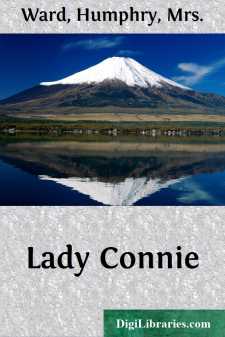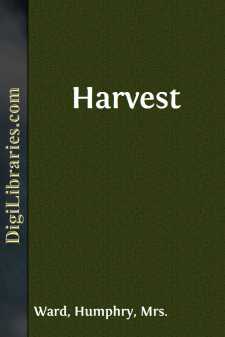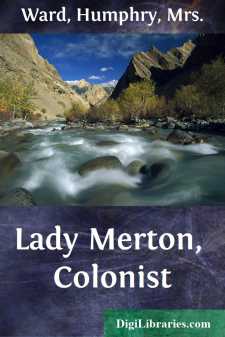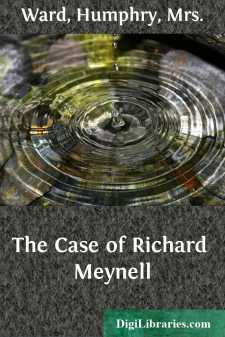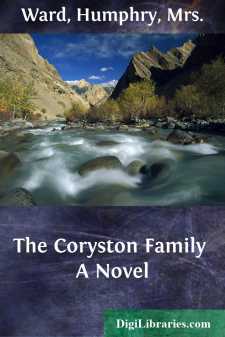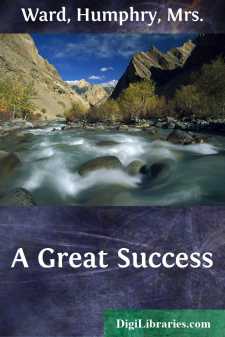Categories
- Antiques & Collectibles 13
- Architecture 36
- Art 48
- Bibles 22
- Biography & Autobiography 813
- Body, Mind & Spirit 142
- Business & Economics 28
- Children's Books 14
- Children's Fiction 11
- Computers 4
- Cooking 94
- Crafts & Hobbies 4
- Drama 346
- Education 46
- Family & Relationships 57
- Fiction 11828
- Games 19
- Gardening 17
- Health & Fitness 34
- History 1377
- House & Home 1
- Humor 147
- Juvenile Fiction 1873
- Juvenile Nonfiction 202
- Language Arts & Disciplines 88
- Law 16
- Literary Collections 686
- Literary Criticism 179
- Mathematics 13
- Medical 41
- Music 40
- Nature 179
- Non-Classifiable 1768
- Performing Arts 7
- Periodicals 1453
- Philosophy 64
- Photography 2
- Poetry 896
- Political Science 203
- Psychology 42
- Reference 154
- Religion 513
- Science 126
- Self-Help 84
- Social Science 81
- Sports & Recreation 34
- Study Aids 3
- Technology & Engineering 59
- Transportation 23
- Travel 463
- True Crime 29
Humphry Ward
Mary Augusta Ward, known by her pen name Mrs. Humphry Ward, was a prolific English novelist and social activist of the late 19th and early 20th centuries. She gained fame with her novel "Robert Elsmere" (1888), which explored themes of religious doubt and reform. Ward was also deeply involved in social causes, including education reform and the women's suffrage movement, although she notably opposed granting women the right to vote.
Author's Books:
Sort by:
by:
Humphry Ward
CHAPTER I EARLY DAYS Do we all become garrulous and confidential as we approach the gates of old age? Is it that we instinctively feel, and cannot help asserting, our one advantage over the younger generation, which has so many over us?—the one advantage of time! After all, it is not disputable that we have lived longer than they. When they talk of past poets, or politicians, or novelists, whom the...
more...
by:
Humphry Ward
CHAPTER I "Well, now we've done all we can, and all I mean to do," said Alice Hooper, with a pettish accent of fatigue. "Everything's perfectly comfortable, and if she doesn't like it, we can't help it. I don't know why we make such a fuss." The speaker threw herself with a gesture of fatigue into a dilapidated basket-chair that offered itself. It was a spring...
more...
by:
Humphry Ward
CHAPTER I LONDON IN THE 'EIGHTIES The few recollections of William Forster that I have put together in the preceding volume lead naturally, perhaps, to some account of my friendship and working relations at this time with Forster's most formidable critic in the political press—Mr. John Morley, now Lord Morley. It was in the late 'seventies, I think, that I first saw Mr. Morley. I sat...
more...
by:
Humphry Ward
I Two old labourers came out of the lane leading to Great End Farm. Both carried bags slung on sticks over their shoulders. One, the eldest and tallest, was a handsome fellow, with regular features and a delicately humorous mouth. His stoop and his slouching gait, the gray locks also, which straggled from under his broad hat, showed him an old man—probably very near his old-age pension. But he...
more...
by:
Humphry Ward
CHAPTER I "I call this part of the line beastly depressing." The speaker tossed his cigarette-end away as he spoke. It fell on the railway line, and the tiny smoke from it curled up for a moment against the heavy background of spruce as the train receded. "All the same, this is going to be one of the most exciting parts of Canada before long," said Lady Merton, looking up from her...
more...
by:
Humphry Ward
A FOREWORD May I ask those of my American readers who are not intimately acquainted with the conditions of English rural and religious life to remember that the dominant factor in it—the factor on which the story of Richard Meynell depends—is the existence of the State Church, of the great ecclesiastical corporation, the direct heir of the pre-Reformation Church, which owns the cathedrals and the...
more...
by:
Humphry Ward
CHAPTER I The hands of the clock on the front of the Strangers' Gallery were nearing six. The long-expected introductory speech of the Minister in charge of the new Land Bill was over, and the leader of the Opposition was on his feet. The House of Commons was full and excited. The side galleries were no less crowded than the benches below, and round the entrance-door stood a compact throng of...
more...
by:
Humphry Ward
CHAPTER I "Arthur,—what did you give the man?" "Half a crown, my dear! Now don't make a fuss. I know exactly what you're going to say!" "Half a crown!" said Doris Meadows, in consternation. "The fare was one and twopence. Of course he thought you mad. But I'll get it back!" And she ran to the open window, crying "Hi!" to the driver of a taxi-cab,...
more...
by:
Humphry Ward
CHAPTER I 'Tak your hat, Louie! Yo're allus leavin summat behind yer.' 'David, yo go for 't,' said the child addressed to a boy by her side, nodding her head insolently towards the speaker, a tall and bony woman, who stood on the steps the children had just descended, holding out a battered hat. 'Yo're a careless thing, Louie,' said the boy, but he went back...
more...
by:
Humphry Ward
CHAPTER I The clock in the tower of the village church had just struck the quarter. In the southeast a pale dawn light was beginning to show above the curving hollow of the down wherein the village lay enfolded; but the face of the down itself was still in darkness. Farther to the south, in a stretch of clear night sky hardly touched by the mounting dawn, Venus shone enthroned, so large and brilliant,...
more...



